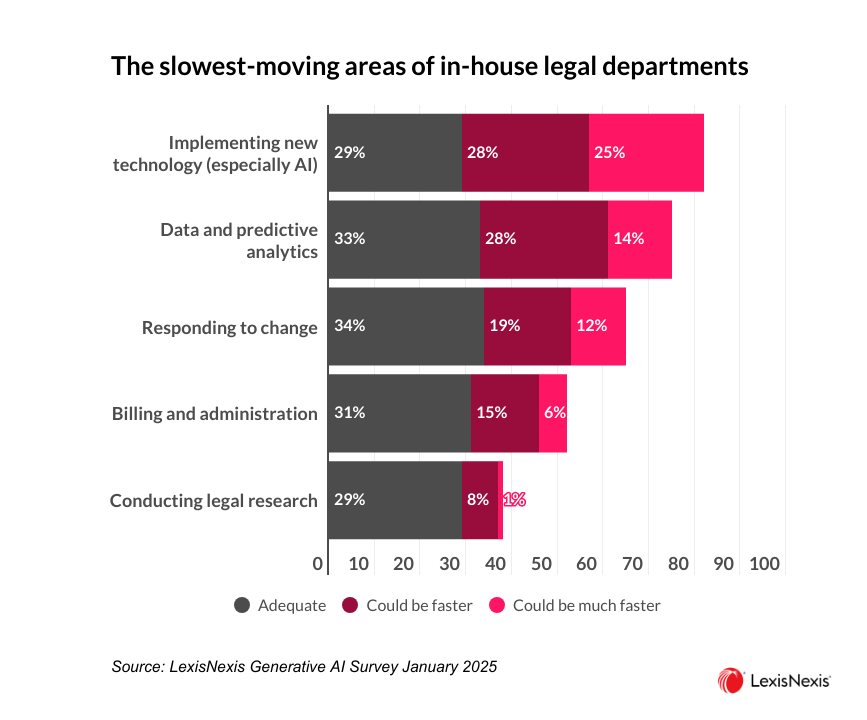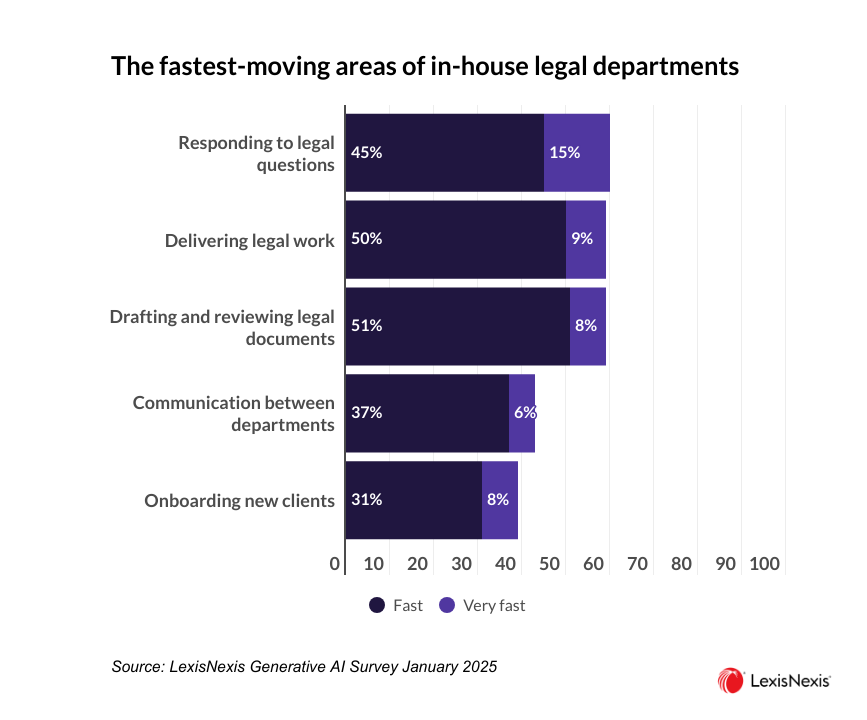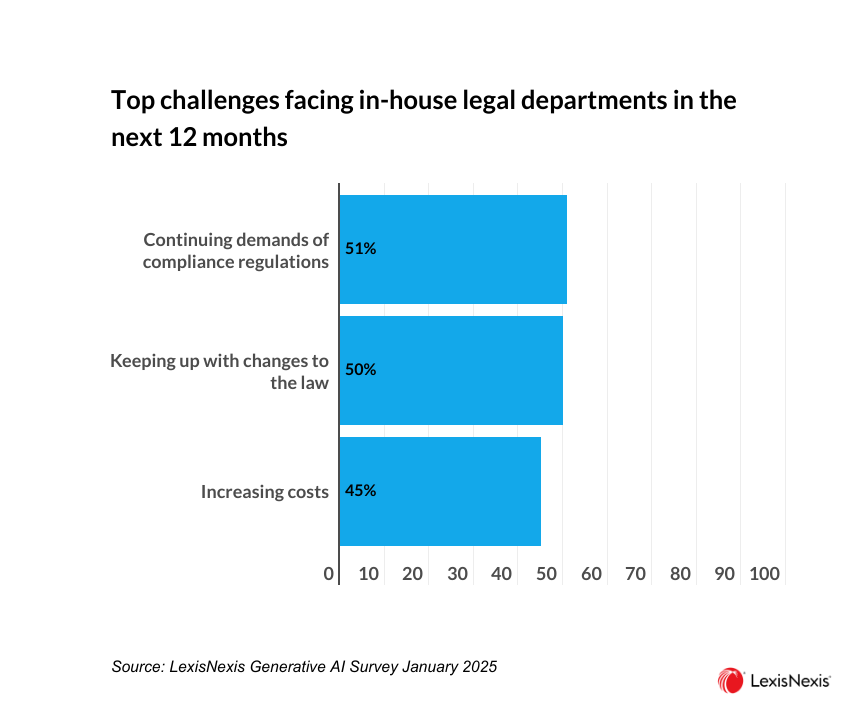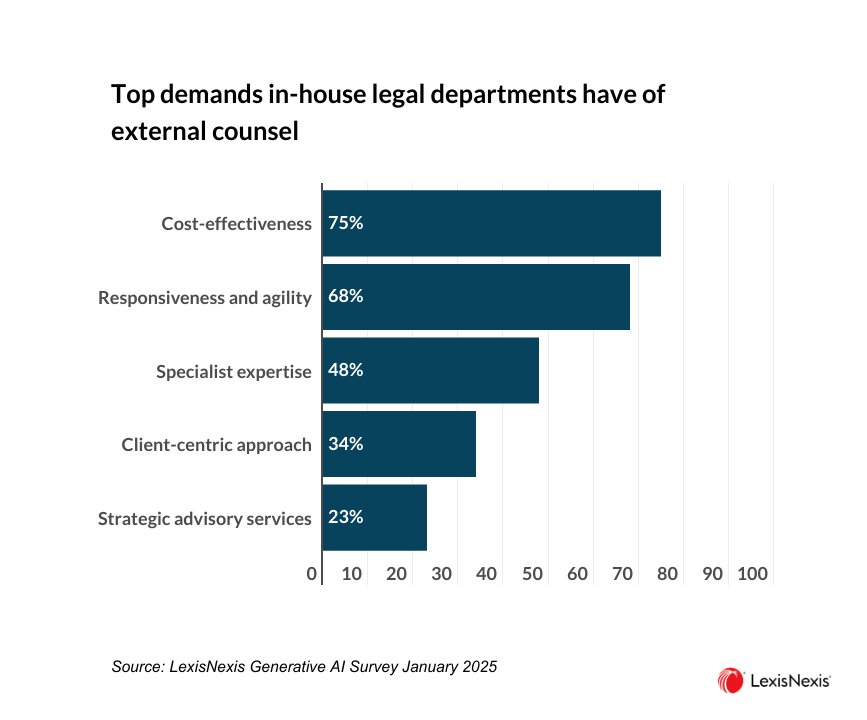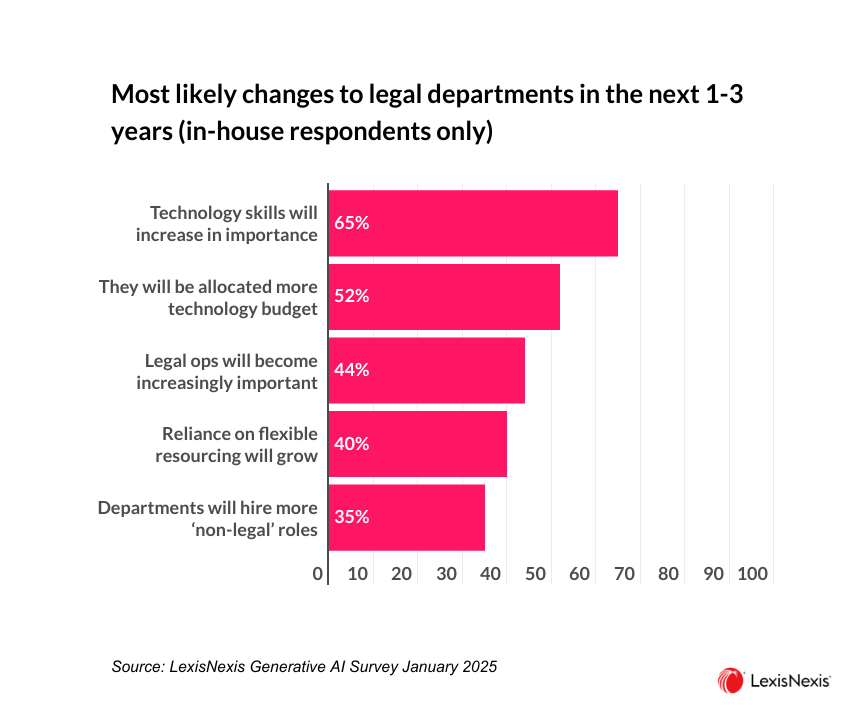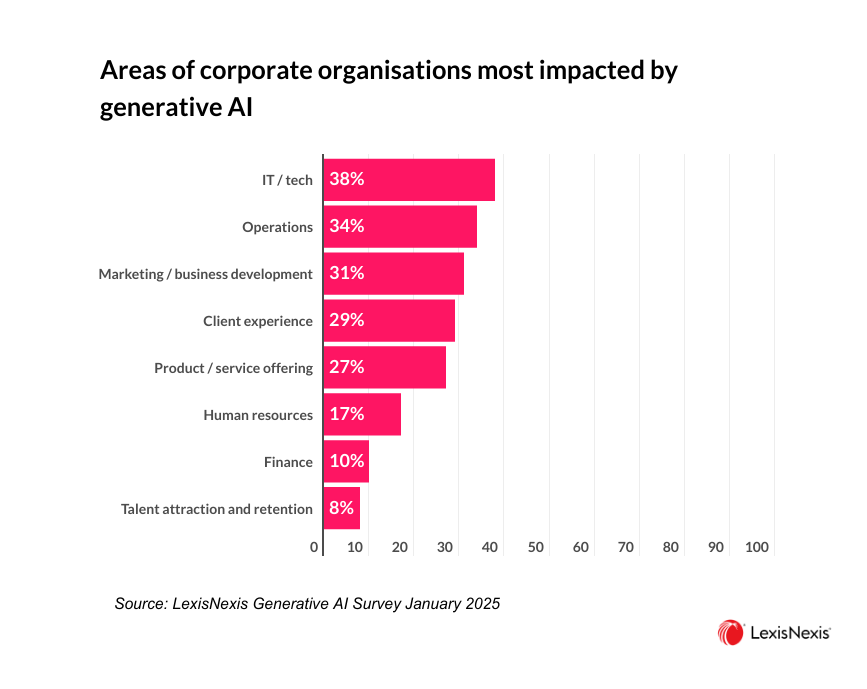Innovating the in-house legal experience
Legal teams can offer so much more than legal support

Corporates take pride in their legal departments' innovative prowess. But in-house lawyers want more.
We look at how legal departments can transform their workflow through innovation.
"Investing in innovation is a no brainer. We need to embrace and use technology to do our jobs better, more efficiently and cost effectively."
Solicitor and in-house senior advisor

Read our exclusive survey of 800+ lawyers and commentary to uncover the areas most in need of innovation.
Top findings:
In-house lawyers want their departments to implement new technology
Only 13% of in-house lawyers
believe their legal department is fast or very fast at implementing new technology. More than four-fifths (82%) said their department is adequate, slow or very slow.
Many want their department to respond quicker to change
Two-thirds of in-house lawyers
said their department is adequate, slow or very slow at responding to change.
Upskilling will become crucial for the in-house function
65% of in-house lawyers
said technology skills will increase in importance in the next 1-3 years.
Lack of tech investment will cause people to leave
One in five (19%)
in-house lawyers said they would consider leaving if their department didn't invest in AI.

Pinpointing areas of innovation
In-house lawyers want to respond faster to technology and change, with outdated processes slowing them down.

In our economic market, corporates need a team of agile, collaborative, tech-savvy lawyers to meet their business goals, and this demand is only going to increase.
But many in-house lawyers, it seems, are worried their organisations aren't doing enough to invest in innovation.
A January 2025 LexisNexis survey found only 13% of in-house lawyers said their legal department is fast or very fast at implementing new technology, especially AI. Instead, more than four-fifths (82%) believe their department is adequate, slow or very slow.
Only 13% said their department is fast or very fast at implementing new technology.
Legal departments have been relatively quick to evaluate, implement and integrate AI into their internal processes, but many lawyers are eager for their organisations to continue pushing for greater AI-powered innovation.
A Group General Counsel at an asset-based lender in Bristol says there's a strong need to focus on using technology to enhance labour intensive but low value work.
"Innovating your workflow can do a significant amount of the heavy lifting, allowing lawyers to focus on the strategy and advice where it is really needed."
It would be great to see technology assisting more on document reviews in litigation and data subject access requests, she added.
Responding to change and making use of data and analytics are also areas in need of greater innovation. Two-thirds (65%) of in-house legal professionals said their department is adequate, slow or very slow at responding to change, while three-quarters (75%) said the same about data and analytics.
The innovation activities of a legal department should closely align with the organisation's current business goals, says Nick West, Chief Strategy Officer at Mishcon de Reya.
"One legal department's priority might be trying to drive productivity improvements into a high-volume contracting process, whilst another's might be creating a better "legal front door" due to an overwhelming number of requests."
Sluggish processes and systems slow legal departments down
Legal departments are pushing hard to meet the rapidly growing demands of corporates, but many are being held back by sluggish systems and processes.
When asked how quickly their legal department conducts legal research, for instance, almost two-thirds (61%) rated their department as adequate, slow or very slow.
Drafting and reviewing legal documents was also considered a challenging area by many, with 39% saying their legal department is adequate, slow or very slow.
Stop settling for slow legal research
Concerningly, two-out-of-five in-house lawyers (40%) said their department is adequate, slow or very slow at delivering legal work in general.
40% said the department is adequate, slow or very slow at delivering legal work
Funnily enough, law firms are suffering from the same challenges. More than half (52%) of private practice lawyers rated their firm's legal research process as adequate, slow or very slow; 45% said the same of their drafting and document reviewing process. Only 18% said their firm is fast or very fast at implementing new technology.
Hélder Santos, the Head of Legal Tech and Innovation at Bird and Bird, believes the biggest areas for innovation are to the client experience, workflow optimisation, and legal drafting.
Enhancing client experience through personalised services and efficient communication builds trust, while technology streamlines workflows and adds value."
I want to streamline my legal workflow with Lexis+ AI
When looking to innovate, in-house teams should prioritise immediate value, says Tony Randle, Partner, Client Tech & Service Improvement at Shoosmiths.
Mapping out the areas that are going to have the biggest positive impact across legal team is the first step."
Randle provided an example. "We identified that building legal tech, including AI, into legal workflows common to most of our practice areas will deliver the greatest positive benefits."
Rounding things up, investing in innovation for innovation's sake – foolish! Pinpointing areas of your business where change will deliver the biggest commercial reward – a game-changer!
Responding to change
Championing change takes careful planning and precision, but it will revolutionise your legal department.

In-house legal departments are up against three very real challenges in the next 12 months: compliance regulations (51%), changes to the law (50%), and rising costs (45%).
In-house legal counsel also expressed what they need from their external counsel in today’s legal market. At the top of the list was cost-effectiveness (74%), responsiveness and agility (67%), and, of course, specialist legal expertise (48%).
In-house teams need cost-effectiveness, responsiveness and agility, and specialist legal expertise
To summarise, in-house legal departments will need their law firms to deliver a superior, data-driven legal service, at the same cost or lower, and at pace.
A General Counsel at an energy company says the biggest area of innovation that needs to take place is to the client experience.
External firms forget they are there as an extension of the internal team and must perform the same way."
A Senior Legal Manager at a global wine and spirit distributor says cost and relevance are the biggest areas in need of innovation.
"Other than cost, our biggest barrier to instruct external counsel is the fear that the work produced will be low quality and not relevant to what we do."
If the legal work is of a good standard, she says, it will most likely cost too much of the budget to outsource in the first place.
A Senior Corporate Counsel at a global professional services business told us what he needs from external counsel at present.
"Law firms should focus on enhancing the client experience through transparent pricing models, predictive analytics, and tailored digital platforms to meet evolving client expectations in a cost-effective manner."
Reassuringly, law firm lawyers have a clear understanding of their clients' needs, even if they can't always meet them. Their top responses to the same question was cost-effectiveness (73%), responsiveness and agility (68%) and specialist expertise (54%).
Laura Hodgson, the AI Lead at Linklaters, says:
"There needs to be a mind shift to recognise that law firms have more to offer than the knowledge in each lawyer’s head: institutional data and new workflows can transform the value provided to clients."
Hodgson from Linklaters says firms should be looking carefully at how technology might change the way they work with clients.
"Think about new ways of creating value, such as providing data-driven perspectives on commercial decisions and sharing insights with clients in a more dynamic relationship."
Summarising documents in seconds with Lexis+ AI
Law firms are in the middle of a confluence of challenges, she says.
"The priority for firms of all types should be to recognise that all these factors are simultaneously at play and each firm needs to identify its own strategic response to what is happening."
Innovation is exciting, but it's also risky
Taking on every good idea. Investing in every new solution. Reacting rather than responding. These commonly followed pitfalls leave legal departments exhausted, confused and out of touch, and that's without mentioning the financial burden.
Amber Foster, a technology and change consultant for in-house legal teams, says there is a real risk when investing in bespoke one-off solutions.
"A real risk for in-house teams is investing in bespoke products, with all the set up costs that it entails, to then find your usual IT providers (Microsoft, or Google Docs) are bringing out equivalent functionality. "
Bhavisa Patel, Director of Legal Technology at Eversheds Sutherland, says new ideas need to address a business problem first and foremost.
"Once you understand the problem, you can determine what good looks like when it comes to testing them out or running pilot programmes."
We always carry out thorough governance and due diligence before anything is tested, says Patel.
"We work hand-in-hand with relevant teams, taking a risk-based approach to ensure that whatever is being tested is reliable and safe, protecting both the firm and our clients’ data."
Deborah Finkler, the Managing Partner at Slaughter and May, says:
"Being risk-averse can be a barrier to innovation and adoption, so we ensure that the data principles and risk assessment tools we have in place are robust, to help us effectively manage risk."
Finkler says her firm is continually piloting new technologies and has a culture in which they can fail fast and learn quickly.
"We try things, establish which best fit the needs of our lawyers and our clients, and if necessary move on."
Implementing innovation
In our era of innovation, launching a new product, process or tool and expecting your team or colleagues to blindly adopt it is not a realistic strategy.
Randle from Shoosmiths says adoption is the pivotal piece of the jigsaw.
"Encouraging people to adopt new technology or new ways of working can be challenging due to resistance to change and a lack of understanding of their benefits."
It's vital to provide comprehensive training and demonstrate practical, real-world advantages to gain user acceptance and trust, he says.
A key focus for Slaughter and May at present is making sure they have the infrastructure and skills in place to realise the benefits of new technology more quickly, says Finkler.
"It’s not just about the tech itself – it’s about how we get it into lawyers’ hands and how they adopt it."
"We need to make sure tech works for them – if it improves the quality of their work or makes their life better, they will use it."
Competing on the legal stage
With AI, every legal process, project or task is now in question. It's up to department leaders to separate the innovation needs from the nice-to-haves.

In a little over two years, we've seen AI adoption penetrate four-fifths of the legal sector. While most lawyers are using or planning to use AI, the demand for more is only continuing to accelerate.
At present, AI has completely revolutionised the business strategies of IT and tech (38%), operations (34%) and marketing and business development (31%) inside corporates.
But in the next one to three years, in-house lawyers expect the following to take place:
- Lawyers will need strong tech skills (65%)
- They will be allocated more technology budget (52%)
- Legal ops will become increasingly important (44%).
I want to book a demo to see how Lexis+ AI works
Corporates will turn to AI to automate more and more processes across their legal departments in the next 1-3 years
"Lawyers will face significant pressure to adopt AI to streamline workflows, enhance efficiency, and remain competitive in delivering cost-effective solutions," says the Senior Corporate Counsel at a global professional services business.
The Group General Counsel at the asset-based lender says:
"We are in an era where traditional skills are unlikely to last you for a whole career and people will have to focus on diversifying their skillset to remain relevant."
This isn't solely about your people and their attitudes towards upskilling. The attractiveness of a workplace is now heavily influenced by the tech tools they have invested in.
If a legal department failed to embrace AI, a quarter (38%) of all lawyers said it would negatively impact their careers, and 19% said they would consider leaving.
One fifth of in-house lawyers would consider leaving if their department didn't adequately invest in AI
Patel from Eversheds Sutherland says embracing innovation will provide a competitive edge.
"Embrace the change, continue to help people learn and adapt, and don’t hesitate to innovate. It will provide a competitive edge."
As with much new technology, AI has exciting potential, but it isn’t a magic solution that makes us all better lawyers overnight, says Finkler from Slaughter and May.
"It’s going to take work and investment to see the benefits, and no-one will always get it right first time."
Finkler also warned of relying too much on the efficiency benefits of AI.
"Whilst that’s valid, I think it’s also quite a narrow view. For me, the most important test is whether this technology can allow us to deliver legal advice even more effectively."
It’s crucial we lay the foundations now to ensure these tools make the work better, and are seen as a positive by clients and our people alike, she says.
As technology becomes more integral to legal practice, departments that fail to invest in new technologies risk losing their competitive edge and valuable talent.
Final thoughts
The legal industry is at a crossroads, where the integration of technology, particularly AI, is essential for maintaining competitiveness.
Despite the clear benefits of AI in enhancing efficiency and effectiveness, many in-house lawyers want their legal departments to move faster to adopt these innovations,.
To thrive, departments must shift their mindset to leverage institutional data and new workflows, offering more than just legal expertise.
Embracing change and investing in technology will not only meet client demands for cost-effectiveness and agility but also foster a culture of continuous improvement.
Ultimately, those departments that strategically navigate these changes will secure a competitive edge in the evolving legal landscape.

Survey methodology

The survey was conducted across 803 lawyers and legal support workers in the United Kingdom and Ireland from August to September, 2024. Surveys were conducted in English.




